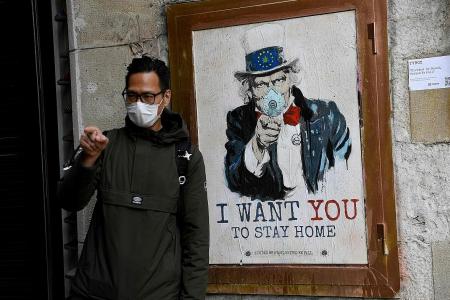France, Spain impose lockdowns as infections cross 156,000
Europe new epicentre of pandemic, says WHO, as virus cases there skyrocket and China reports sharp decline in new infections
PARIS: France and Spain became the latest European nations to impose lockdowns, while Australia joined New Zealand in ordering self-isolation for all arrivals starting yesterday.
This comes as the number of infections around the world passed 156,000, with more than 5,800 deaths.
A week that saw schools and businesses shut down indefinitely, millions of travellers barred from crossing borders, celebrities and politicians infected and the whole of Italy locked down ended with a flurry of government announcements.
France ordered the closure of restaurants, bars, cinemas and nightclubs - but said food shops, pharmacies and banks would remain open, and pressed ahead with voting for local elections yesterday despite the virus threat.
Spain imposed a near-total nationwide lockdown, banning people from leaving home except to go to work, get medical care or buy food.
Covid-19 has so far claimed 196 lives in Spain, making it the worst-hit European country after Italy. Prime Minister Pedro Sanchez's wife is among those infected.
European nations ramped up border controls while squares and streets from Milan to Madrid were deserted on Saturday as government calls to stay at home were heeded by most.
Some Italians took to singing to each other from their windows to beat the isolation, while the Vatican said yesterday that its traditional Easter week celebrations would be held without worshippers.
The country that saw the biggest increase in fatalities over the last 24 hours was Italy, which recorded more than 170 deaths, while Iran had nearly a 100 and Spain at least 60.
Australia yesterday announced all arrivals in the country will face mandatory 14-day self-isolation.
"We are going to have to get used to some changes in the way we live our lives," said Australian Prime Minister Scott Morrison.
NEW EPICENTRE
The World Health Organisation (WHO) has confirmed Europe as the new epicentre of the pandemic after a dramatic slump in domestic cases in China, where the virus first emerged in December last year.
Governments are also facing public health dilemmas - whether to try to stamp out the disease entirely with drastic restrictions or try to manage its spread.
British officials have argued for managing the outbreak to push the peak of the crisis to summer when hospitals will be able to cope better.
They have said this will help create "herd immunity", though experts are divided over whether there is evidence to support the theory.
"We don't know enough about the science of this virus, it hasn't been in our population for long enough," said WHO's Margaret Harris.
Africa has so far been spared the worst of the illness, but Rwanda declared its first case on Saturday in a sign of the widening global spread.
Madagascar said it was suspending flights to Europe for a month from March 20.
Also growing was the impact on the sporting calendar, with football seasons curtailed, Formula One races postponed and cricket tours called off. - AFP
Get The New Paper on your phone with the free TNP app. Download from the Apple App Store or Google Play Store now



